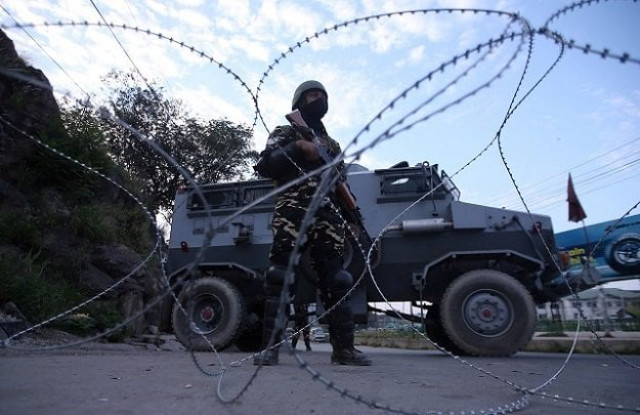War is out
Considering our economy, Pakistan would prefer political polarisation and strategic standing in the comity of nations

PHOTO: REUTERS.
New Delhi has a different war on its hands — a war against the people of India-occupied Kashmir (IOK). India seems to have bitten more than it can chew. The Indian Supreme Court has already admitted pleas against New Delhi’s August 5 action while the central government is finding it increasingly difficult to decide whether or not to extend the lockdown which is entering its fourth week, giving a lie to India’s claim that everything is under control in IOK.
In fact, not only concerned Indians but also world capitals are waiting for the oppressive curbs to be lifted with crossed fingers because of the expected fury with which the people of IOK would, in their opinion, hit back at the occupying troops, unleashing a struggle that would, in all likelihood, be the final encounter. But that point is going to take decades to reach because of the asymmetry between the two combatants — about seven million unarmed people versus mighty India.
The world media is already saying that India’s decision is another step in New Delhi’s long history of colonising Kashmir. It has tellingly assessed that India has shot itself in the foot.
Under world pressure, Prime Minister Narendra Modi has climbed down from calling the issue an internal matter to conceding that it is a bilateral problem. He has also tried to assuage the growing international anxiety by further conceding that the Shimla Accord could be retrieved and negotiation with Pakistan resumed.
Considering the current state of our economy, Pakistan would prefer political polarisation and strategic standing in the comity of nations. This is notwithstanding its aggressive rhetoric such as the threat of a nuclear conflagration and some actions it has already taken like downgrading its diplomatic and trade relations with India.
Ultimately it seems that India and Pakistan would have to resume their bilateral negotiations on Kashmir. But to be able to persuade their respective nations to come along the talks route, the leaders in the two countries would first need to create conditions conducive to selling the idea to their public which has been whipped up for a war since early this year.
However, for a final peaceful resolution of the issue the two would also need to bring into the equation the party — the people of Jammu and Kashmir — whose fate is to be decided at the talks. For this, India would have to talk to IOK’s genuine leadership which now perhaps includes Hurriyat leaders as well as persons of stature like Farooq and Omar Abdullah and Mehbooba Mufti. All three former chief ministers of IOK are known for their pro-India stance, but their incarceration before the August 5th action is a measure of distrust that exists between India and the people of IOK.
While we wait for India to finally come out of its no-talk mode we need to fight our case where it matters the most like capitals of rich countries. This has remained the weakest aspect of our Kashmir policy all these years. Since Pakistan’s inception we have used whatever earned or unearned political goodwill we had in these rich capitals for acquiring as much dole as possible to finance the demands of a security state, thus winning a global image of living on rich countries’ charity. Hardly the right image for mobilising international support for even a genuine cause like IOK’s forcible annexation by a “progressive”, “liberal” and “secular” India that has suddenly gone the Hindutva way.















COMMENTS
Comments are moderated and generally will be posted if they are on-topic and not abusive.
For more information, please see our Comments FAQ